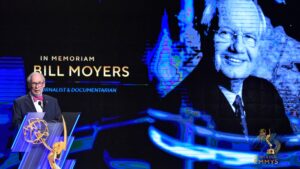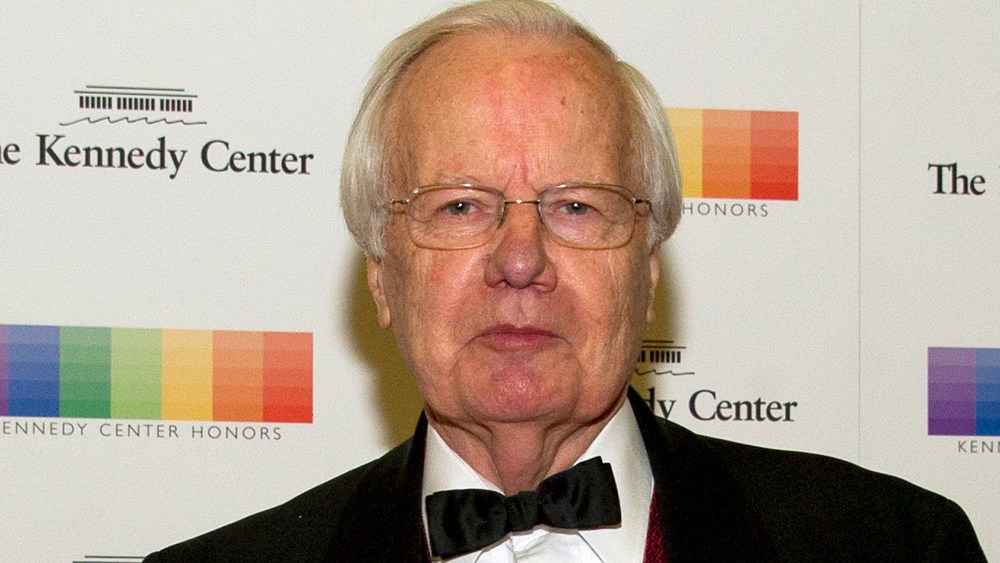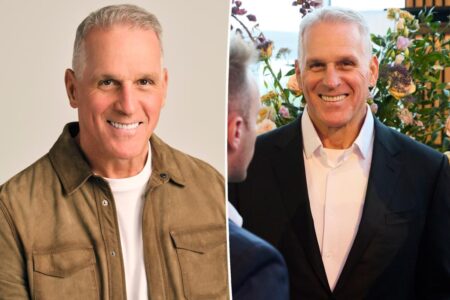Bill Moyers, who carried an unblemished air of moral conviction throughout a 43-year career as a broadcast journalist, mostly in his later years for PBS, died Thursday in Manhattan, the New York Times reported. He was 91.
Moyers was characterized by an insatiable and wide-ranging intellectual curiosity, but he was deeply concerned not only with how things are but how they should be.
He was also well known for his views that the mainstream media reflect the bias inherent in their ownership by giant corporations whose goals align with those of the right. But despite uncovering disappointing behaviors on the part of politicians and various institutions over the years, Moyers was fundamentally an idealist.
In an op-ed in the Washington Post, the Nation editor and publisher Katrina Vanden Heuvel wrote: “Moyers constantly reminded us of journalism’s indispensable role in our democracy. Instead of providing yet another venue for the predictable preening of establishment leaders, Moyers gave a platform to dissenting voices from both the left and the right. Instead of covering the news from the narrow perspective of the political and corporate elite, Moyers gave voice to the powerless and the issues that affect them. ‘We journalists are of course obliged to cover the news,’ he once said at an event hosted by the Nation Institute in Washington, D.C. ‘But our deeper mission is to uncover the news that powerful people would prefer to keep hidden.’”
Moyers retired and changed his mind twice before the true finale to his career in 2017. “Please remain vigilant and engaged as citizens in the civic and political life of your community and our country,” he wrote in his sign-off note. “Democracy is fragile, and no one can say with certainty that it can withstand the manifold risks to which it is now exposed. Thank you for the company we have shared in this space — and good luck to all.”
Moyers was White House press secretary in the administration of President Johnson from 1965-67, and as such was allegedly involved in the bullying of journalists over their coverage of Vietnam, according to Morley Safer, before breaking with Johnson; Moyers was also an ordained Baptist minister.
He began his long, though not uninterrupted, relationship with PBS in 1971, when he began hosting the current affairs program “Bill Moyers Journal,” which, in its first iteration, ran until 1976; then from 1979-1981; and finally from 2007-10.
Moyers began a stint at CBS in 1976. He was editor and chief correspondent for CBS Reports from 1976-80 and senior news analyst and commentator for the CBS Evening News with Dan Rather from 1981-86, becoming the last regular commentator for that broadcast. Ultimately Moyers opted not to renew his contract with CBS, citing commitments with PBS. Later, in 1995, he did a brief stint as a senior analyst and commentator at NBC News, becoming the last regular commentator on the NBC Nightly News; the following year he signed on as the first host of sister cable network MSNBC’s “Insight” program.
While at CBS, Moyers hosted for PBS the noted 1982 series “Creativity With Bill Moyers,” in which the journalist examined various forms of creative expression by interviewing celebrated artists and performers about their influences and inspiration, and looking at unusual outlets for the creative impulse. Those interviewed included Samson Raphaelson, Maya Angelou, Judy Chicago, John Huston, Norman Lear and Pinchas Zukerman.
After exiting CBS, Moyers and his wife, Judith Davidson Moyers, formed the production company Public Affairs Television. Among its first productions was the popular 1988 PBS documentary series “Joseph Campbell and the Power of Myth,” six one-hour interviews conducted by Moyers with mythologist Joseph Campbell, whose influence is evident in George Lucas’ “Star Wars” saga. Twelve years after the making of “The Power of Myth,” Moyers and Lucas reunited for the 1999 interview “The Mythology of Star Wars With George Lucas & Bill Moyers,” in which they further discussed the impact of Campbell’s scholarly efforts on Lucas’ work.
In 1987 Moyers produced two programs related to the application of the U.S. Constitution in contemporary life. The documentary “The Secret Government: The Constitution in Crisis” concerned the executive branch’s infringement on the limitations of its powers as provided by the Constitution. It advanced the notion of a militaristic streak in U.S. foreign policy both historically and as revealed in the form of the recent Iran-Contra affair. Conservatives attacked the documentary, which was long cited as evidence of liberal bias at the Corporation for Public Broadcasting and PBS and thus as part of the Republican argument for shuttering the pubcaster.
During the same year Moyers produced the 11-part documentary “In Search of the Constitution,” which celebrated the bicentennial of the document’s signing and analyzed both the two centuries since that event and the current state of affairs. Four episodes were devoted to interviews with sitting Supreme Court justices.
In 1988, Moyers produced the interview series “World of Ideas,” featuring writers, artists, philosophers, scientists, and historians he had come to know, many with little prior exposure in the mass media.
Reviewing the series, the New York Times declared: “Mr. Moyers and his guests seriously explore the future. Complex issues are not reduced to 15-second sound bites. There is time for thought and consideration. In short, Mr. Moyers is doing what he does best: exploring, illuminating, defining the public pickle — precisely what public television is supposed to be doing.”
Moyers revived the series in 1990 and penned companion books for both iterations of the series. His first guest on “World of Ideas” was film industry sage David Puttnam.
In 1995 Moyers presented the PBS series “The Language of Life,” which explored the work of contemporary poets such as Adrienne Rich, Robert Bly and Gary Snyder.
Moyers was host of “Now With Bill Moyers,” a PBS newsmagazine, from 2002-04.
In 2006, he presented two series on PBS: “Faith and Reason,” a series of conversations with esteemed writers of various faiths and of no faith, explored the question “In a world in which religion is poison to some and salvation to others, how do we live together?”
The second series, “Moyers on America,” analyzed the ramifications of three important issues: the Jack Abramoff scandal; evangelical religion and environmentalism (Evangelical environmentalism); and threats to open public access of the Internet.
After returning in 2007 with the final iteration of his show “Bill Moyers’ Journal,” Moyers launched his final series, “Moyers & Company,” in 2012 and concluded it in January 2015.
Kenneth Tomlinson, appointed chairman of the Corporation for Public Broadcasting by President George W. Bush, criticized Moyers on an ongoing basis for a liberal bias, and others on the right also consistently attacked him, often citing Moyers as key evidence of an overall liberal bias at PBS. According to a report of the CPB Ombudsman, Moyers responded to Tomlinson’s attacks by saying, “Tomlinson found kindred spirits at the right-wing editorial board of the Wall Street Journal where the ‘animal spirits of business’ are routinely celebrated.” He did not hypocritically deny his strident liberalism but simply asserted that he was right.
Billy Don Moyers was born in Hugo, Oklahoma, and was raised in Marshall, Texas. He got his first job in journalism as a reporter at the local paper in Marshall while he was still in high school.
He studied journalism at North Texas State College in Denton. In 1954 he was a summer intern by then-U.S. Senator Lyndon B. Johnson, who eventually promoted him to manage his personal mail. Soon after, Moyers transferred to the University of Texas at Austin, where he wrote for the college newspaper, graduating in 1956 with a Bachelor’s degree in journalism. While in Austin, Moyers was assistant news editor for KTBC radio and television stations, owned by Lady Bird Johnson, wife of then-Senator Johnson.
Moyers was ordained in 1954. In 1956-1957, he studied issues of church and state at the University of Edinburgh in Scotland. He received a Master of Divinity degree from Southwestern Baptist Theological Seminary in Fort Worth, Texas, in 1959. He was subsequently a Baptist pastor in Weir, near Austin.
Moyers served as a top aide to Johnson during the senator’s unsuccessful bid for the 1960 Democratic U.S. presidential nomination; in the general campaign he served as liaison between Democratic vice-presidential candidate Johnson and the party’s presidential nominee, Sen. John F. Kennedy.
During the Kennedy Administration, Moyers served as deputy director of the Peace Corps from 1962 to 1963. When Johnson took office after the Kennedy assassination, Moyers became a special assistant to the president from 1963 to 1967. Moyers acted as the president’s informal chief of staff from October 1964 until 1966. From July 1965 to February 1967, he also served as White House press secretary.
Eventually a rift developed between Moyers and the president, and Moyers secured a position as publisher for the Long Island, N.Y., daily newspaper Newsday, where he served from 1967 to 1970. The right-leaning publication had been unsuccessful; Moyers moved the paper in a more progressive direction, bringing in writers such as Pete Hamill, Daniel Patrick Moynihan, and Saul Bellow, and increasing the publication’s investigative reporting and analysis. Circulation increased and the publication won two Pulitzer Prizes, but the owner, conservative Harry Guggenheim, was unhappy with the paper’s shift to the left, and he and Moyers were divided over the Vietnam War and the 1968 presidential election. Guggenheim sold his majority share to the then-conservative Times-Mirror Company even though an employee-led counter-offer was $10 million higher; Moyers resigned a few days later.
The journalist began working for PBS in 1971.
Moyers wrote a large number of books, many in synergy with his television series.
Moyers was inducted into the Television Hall of Fame in 1995. He received a Lifetime Achievement Emmy Award in 2006, whereupon the the National Academy of Television Arts and Sciences declared, “Bill Moyers has devoted his lifetime to the exploration of the major issues and ideas of our time and our country, giving television viewers an informed perspective on political and societal concerns. The scope of and quality of his broadcasts have been honored time and again.”
He received more than 30 Emmys and television journalism prizes including a gold baton from the Alfred I. duPont-Columbia University Awards, a lifetime Peabody Award, and a George Polk Career Award for contributions to journalistic integrity and investigative reporting.
Moyers is survived by his wife, former producer Judith Davidson Moyers, whom he married in 1954; three children, Alice Suzanne Moyers, William Cope Moyers (a producer for CNN who struggled to overcome alcoholism and crack addiction as detailed in the book “Broken: My Story of Addiction and Redemption”) and John Davidson Moyers, who assisted in the foundation of TomPaine.com, an online public affairs journal of progressive analysis and commentary; and five grandchildren.
Read the full article here








